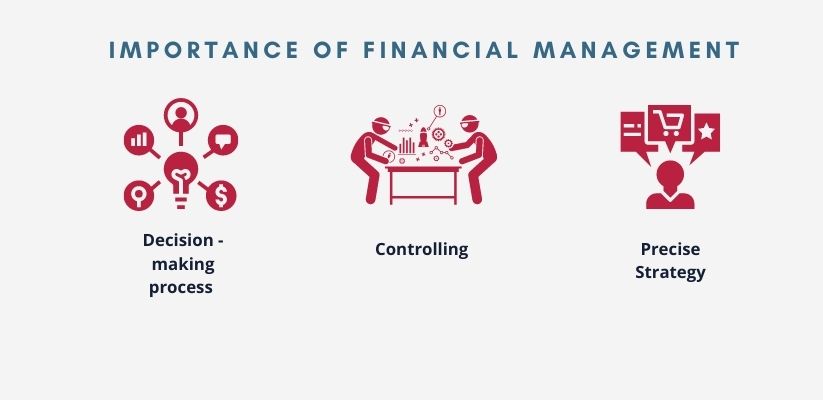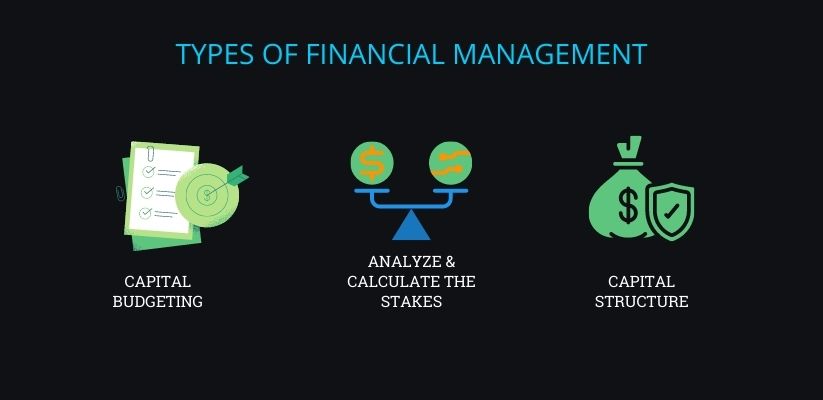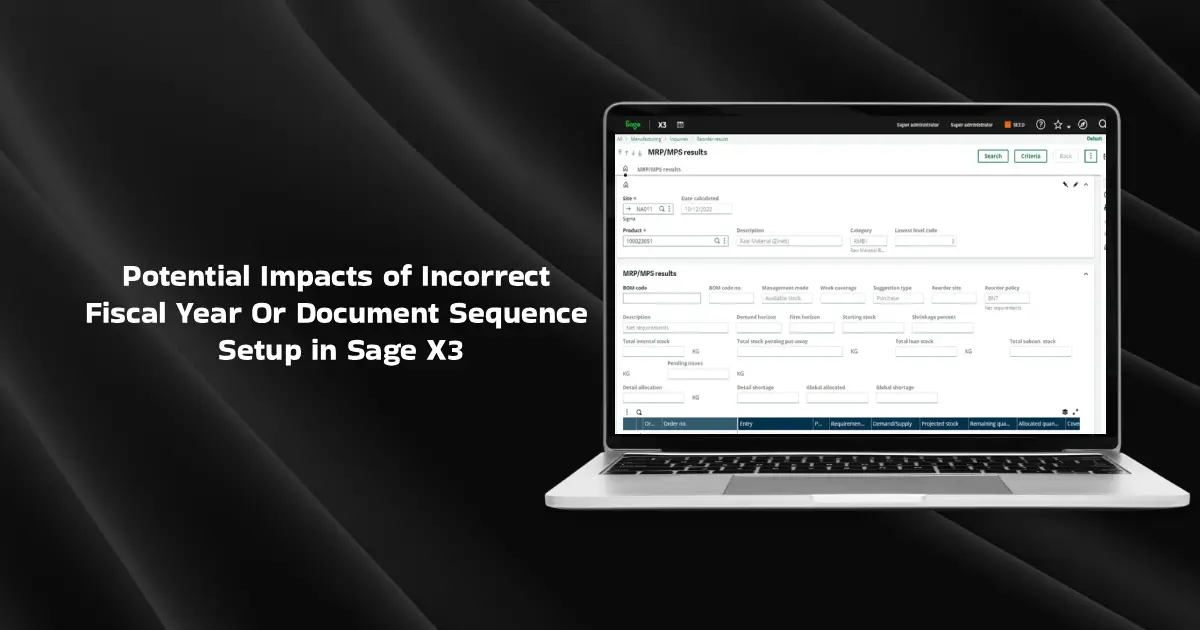Finance is the lifeline of any organization and it requires meeting the needs of all business issues. With the increasing competition in the market, companies need to face a lot of obstacles. However, with proper planning and appropriate study of financial management, especially understanding The Objective of Financial Management, the obstacles can be easily overcome.
What is Financial Management?
Financial management is the process of developing a business plan while making sure that all departments stay on the same page. Sturdy financial management aids the finance leaders in offering data that would support a long and vivid vision. Also, it helps leaders to make informed decisions about investing while fetching insights more on liquidity, investments, expense, and more.
- Financial management involves the planning, management, allocation and control of financial resources of the organization.
- To measure financial success, finance leaders use KPIs and tracking tools to ensure that every department operates within budget and generates maximum returns from its allocated resources.
With the help of the enterprise resource planning ERP software, finance teams of organizations can accomplish these goals. A perfect finance management system can easily combine various financial functions, including fixed-asset management, payment processing, and the cost of recognition.
Once you integrate these essential elements, an advanced financial management system would make sure that real-visibility exists and facilitates routine business operations such as time-end close procedures.
Key Objectives of Financial Management to Consider
1. Profit escalation
An organization is usually launched with the primary goal of fetching enormous profits, which is why profit maximization is the most crucial objective of financial management. Businesses should get optimum yields in the long and short business run.
2. Wealth boost
The businesses are recommended to focus on increasing the value of shareholders. However, shareholders are no one but the actual owners of the organization. Since wealth maximization is the top objective of financial management, the dividend and payout policy should be fixed.
The finance executive should distribute max dividends to keep the customers happy while improving the company’s position. If the performance of the company is better, then the company will have a higher amount of market price with wealth maximization.
3. Liquidity maintenance
Through appropriate financial management, the leaders in the organization can track regular liquidity supply in the business. It is one major objective of financial management to help managers keep a keen eye on all outflow and inflow of money so as to lower the risk of cash overflow and underflow.
If there is a healthy cash flow, it means an increased possibility of sustenance and business success. This helps appropriately deal with uncertain situations, on-time payments, cash discounts, and processing routine delays on time.
4. Accurate estimation of financial needs
A prime objective of financial management is to assist financial managers in predicting the organization’s real financial needs. It includes the estimations in terms of the capital required to initiate a business, fixed capital of the company, and more. In the absence of this estimation, there will surely be a shortage of finance.
To bring such estimation in place, the finance manager considers different factors such as technology, the number of employees, legal requirements, the scale of operations, and more.
5. Appropriate usage of financial resources
With a proper finance management platform, businesses can utilize financial resources at their best. To accomplish this task, the financial manager can leverage various tools, including better inventory management, managing receivables, efficient policies, and more.
These tools help save a lot of expense while also reducing the wastage of resources in a single go.
6. Reduced operating task
A finance manager faces many issues, risks, and uncertainties in performing daily business functions. Another major objective of financial management is to lower the operating task.
A better finance management platform helps reduce the concerns while offering solutions to the problems. Also, this allows businesses to make informed decisions with proper thought.
7. Success measurement
The most significant objective of financial management of a company is to earn huge profits from the business. In short, the success of any organization lies in the revenue earned so far.
But, an advanced financial management module not just helps increase the company’s revenue but also helps measure the company’s success.
With accurate reports and accounting details, businesses can quickly analyze their last year’s performance with the current year’s performance.
8. Developing reserves
The business market is flooded with uncertainties, including climate change, natural disasters, frequently changing customer preferences, technology shifts, etc.
To overcome these issues, companies should always focus on forming small reserves.
With the help of dividend payout policies, companies can develop enough reserves. The reserves create not only help gain profits but also aid in dealing with unnecessary situations in the future.
9. Balance business structure
A robust finance management platform offers a properly balanced capital structure to the organization. In other terms, it helps bring an appropriate balance between the different capital sources, including bonds, equity, loans, gain earnings, and more.
10. Investment decisions
For a finance manager, another important task is to decide where to invest the surplus profit. Leaving the cash idle in the bank makes no sense. So they must determine whether the profit should be invested in buying land for future use, start a new assembly line, invest in new machinery, or automate production workflows. While investment options can vary and even include the acquisition of a company, buying equity shares of another company, and so on, the finance manager must calculate the associated returns and risks to make an impactful decision that generates more profit for the company
However, these factors help gain flexibility, stability, and liquidity in the company.
It is the main objective of financial management since it systematically balances the overall structure of a company.
Significance of financial management
Financial management is the crucial platform of any business. Without proper financial planning and management, the company might face a considerable decline. So, let us have a glance at the significance of financial management.
Accurate strategy
Analyzing the business’s necessary needs to accomplish this prime objective of the organization’s financial management. It is an essential thing to achieve long and short-term goals. This helps achieve success in the current scenario of the business.
Controlling
This element makes sure that every department has its vision and is successfully operating within budget. It also ensures that everything is in alignment with a proper strategy.
Decision-Making Process
This element helps business leaders make informed and best ways to execute varied plans by continuously updating financial reports and data on relevant KPIs. With proper financial management, employees get an idea of where the company is going and better visibility in the business process.
Importance of Financial Management Objectives
Financial management objectives are crucial for CFOs to lead the organization by maintaining financial stability in its day-to-day operations while meeting the company’s long-term financial goals. The objectives provide a focused direction for managing working capital and cash flow as well as optimizing resource allocation.
The fundamental objectives of financial management include maximizing profits, maintaining liquidity, estimating financial requirements, and maintaining a balanced capital structure. When professionally followed, these objectives unlock a new level of operational efficiency. Besides, it significantly improves the risk-handling capacity of the organization.
Types of Financial Management
Capital Budgeting
Financial management deals with identifying the organization’s financial needs to gain short-term/long-term goals. Also, it checks where should be the capital funds expanded to support total growth.
Working Capital Management
This type ensures that there is an ample amount of cash available for daily business operations. These operations include buying raw materials for production and paying workers.
Capital structure
Capital structure helps check the way in which operations/ growth can be paid. It also reviews how to take debt. In some cases, organizations may ask for funding from a private firm, thinking about all the selling assets such as real estate and more.
Scope of Financial Management
Financial management has a far-reaching impact on the overall financial health of the organization. From planning and budgeting to risk management and standardizing procedures, a successful financial management strategy covers multiple aspects.
- Planning: Planning focuses on determining the amount of cash needed to maintain a healthy working capital, fund expansion plans like increasing production capacity or developing new products. Besides, certain cash is planned to meet market uncertainties.
- Budgeting: Budgets simplify fund allocation to projects, operations and departmental needs. Once the master budget is ready, the funds can easily be distributed. Different budgets a finance manager has to form may include capital budget, operating budget and project budget.
- Risk Management: No business is immune to risks. However, the impact of risk on business can be reduced to a certain extent through sound financial planning. Some of the risks a finance head needs to prepare for are credit risks, operational risk, liquidity risks and market risks.
- Standardizing Procedures : Procedures are defined guidelines on how financial activities will be conducted. Whether it is approving purchase orders, issuing invoices, or making payments, it must be done as per documented principles. The procedures also specify personnel responsible for making financial decisions.
Financial Management Objectives FAQs
1. What Is Meant By Financial Management In Simple Words?
In simple words, financial management is the planning, management, allocation and control of the organization’s financial resources. It essentially involves the measurement of financial KPIs to take data-driven decisions and maximize profits.
2. What Is The Prime Objective Of Financial Management?
Every business is in the business of making a profit, so the prime objective of financial management is to maximize the company’s profit, backed by well-informed decisions on capital, resources and investments.
3. What Are The Objectives Of Financial Management?
The various objectives of financial management are profit and wealth maximization, liquidity maintenance, risk management, fund allocation, ensuring effective utilization of resources, and identifying investment opportunities.










